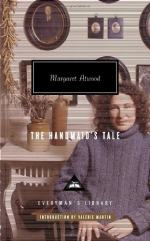|
This section contains 1,876 words (approx. 5 pages at 400 words per page) |

|
In the following excerpt, Malak examines how Atwood infuses the conventions of the dystopian genre with her own distinctive artistry in The Handmaid's Tale.
One of [The Handmaid's Tale's] successful aspects concerns the skillful portrayal of a state that in theory claims to be founded on Christian principles' yet in practice miserably lacks spirituality and benevolence. The state in Gilead prescribes a pattern of life based on frugality, conformity, censorship, corruption, fear, and terror-in short, the usual terms of existence enforced by totalitarian states, instance of which can be found in such dystopian works as Zamyatin's We, Huxley's Brave New World, and Orwell's 1984.
What distinguishes Atwood's novel from those dystopian classics is its obvious feminist focus. Gilead is openly misogynistic, in both its theocracy and practice. The state reduces the handmaids to the slavery status of being mere "breeders." ... The handmaid's situation lucidly illustrates Simone de Beauvoir's...
|
This section contains 1,876 words (approx. 5 pages at 400 words per page) |

|




